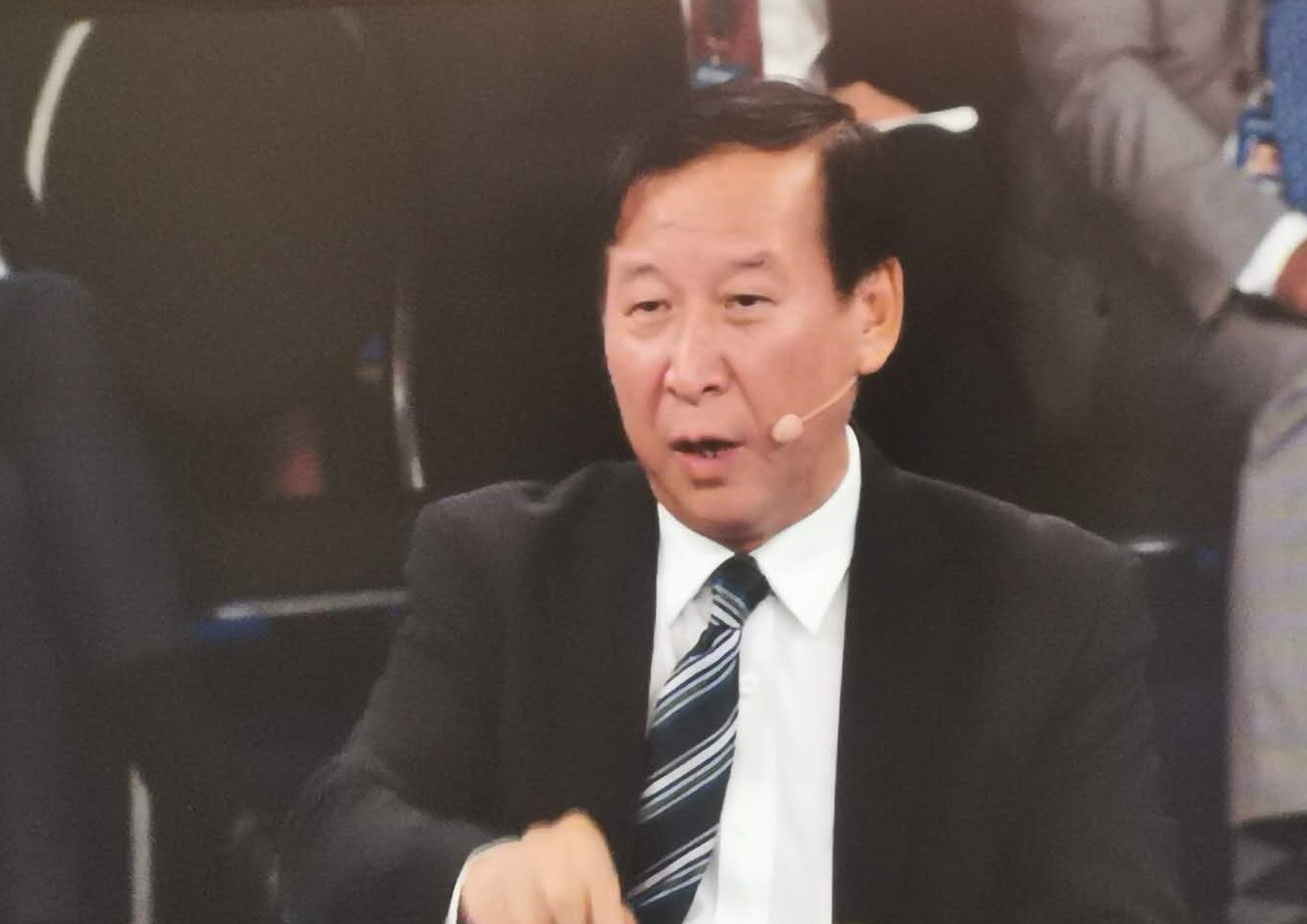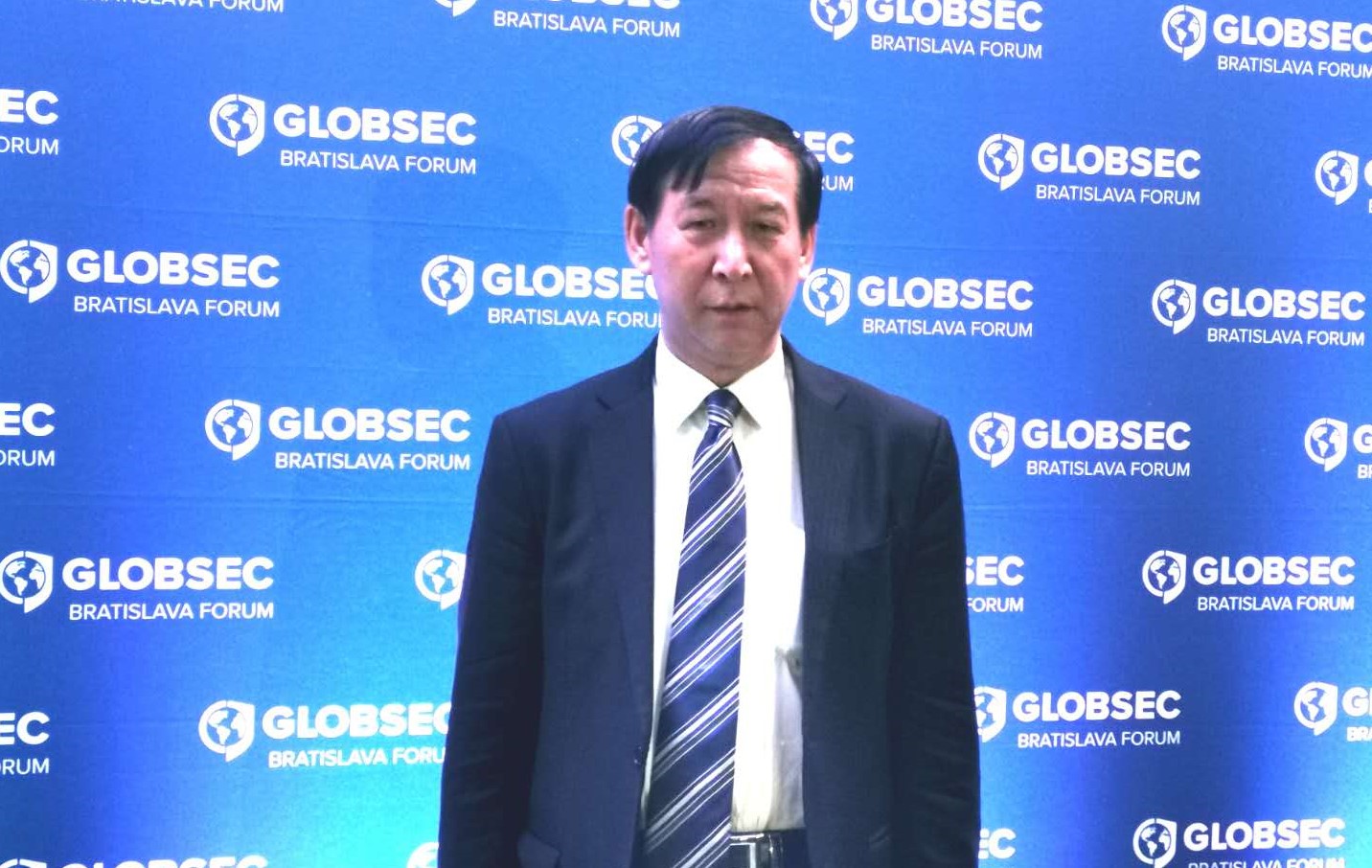Yu Hongjun, Senior Researcher of Taihe Institute, attended the 14th Bratislava Global Security Forum (GLOBSEC), from June 4th to June 8th, 2019. During the meeting, Yu accepted a written interview with the TASR (News Agency of the Slovak Republic). In the interview, Yu explained China’s basic views and policy ideas on the current international situation, and expressed the open attitude of Chinese scholars to be engaged in international exchanges and dialogues. The main content of the interview is as follows.

Q: What do you expect from the 2019’s “Global Security Forum”?
A: As is known to all, Slovak security forum is one of the three largest security forums in Europe, whose influence expands beyond Europe. I am very glad to be invited to attend this forum, and to discuss global security, a major issue facing humanity nowadays, with political leaders and experts from around the world. We hope to speak our minds freely, set aside our differences and reach consensus in the seminar, so as to offer more valuable new insights on the maintenance of regional and global security and stability, peaceful development, and win-win cooperation. At the same time, we aspire to promote exchanges and dialogues between think tanks from different countries, enhancing policy sharing and people-to-people exchanges among different nations. Strategic trust of larger scale and higher level is expected to be reached. We are looking forward to the fruitful outcome of this forum. More experience is about to be gained for better achievements in the future. I am willing to join the next dialogue as well, to be engaged in more meaningful conversations, dialogue and discussion with experts and scholars from diverse backgrounds.
Q: What do you think is the most pressing security issue facing the world today, from China’s perspective? How does China plan to deal with it?
A: Today’s world is faced with a diversified, complicated and sharpened risks and challenges. Every security issue that people are generally concerned about is rather pressing. In the aspect of political security, hegemonism and power politics is still hindering international cooperation in solving global problems. This is followed by environmental degradation, especially global warming. This question involves whether human beings can survive and proliferate normally. What it reveals is actually the threat from nature that human beings must face as a community of destiny. There are also economic and financial security issues, and this issue affects the vital interests of every citizen and every resident of the global village. Of course, all forms of national separatism, international terrorism, extremism, racism and organized transnational criminal activities have long threatened regional and global peace and stability. In the fields of energy, food, network, nuclear energy control, etc., there are also different levels of security risks. These problems may occur in different eras or in different countries. Different countries may have different forms of expression. Facing the new situation and new problems brought about by the intertwining of traditional security and non-traditional security, we advocate multilateralism, solidarity and cooperation, and advocate the full play of the role of international organizations and institutions represented by the United Nations. At the same time, China has also noted the strength, wisdom and role of civil society organizations, and actively encourages civil organizations and institutions to participate in various forms of security dialogue and participate in regional and overall security cooperation. The Chinese people also earnestly hope that the people of all countries in the world can work together and work together to solve the various security problems facing the world today.
Q: Do you think multilateralism will be the main principle in solving international problems, in the coming years? Or do you think unilateral action will prevail?
A: I believe that in the next few years or many years to come, the various consultation and exchange mechanisms and the platform for consultation and dialogue based on multilateralism should always be the main means to solve the common problems of human society. In other words, multilateralism should be the primary consensus of leaders of all countries to solve international problems, because it conforms to the historical direction and conforms to the trend of democratization of international relations. Judging from the trend, Although few countries have recently engaged in unilateralism, continually tearing up international agreements, withdrawing from international organizations, and abandoning international commitments, the banner of multilateralism is unlikely to fall. The complexity of global issues and challenges determines that multilateralism is inevitably the primary means of solving global problems, or even the only option. On the other hand, we must see that as the comprehensive strengths of emerging market countries and large developing countries continue to rise, the international power comparison is undergoing profound changes. Individual countries seeking to establish a unipolar world are destined to encounter strong resistance from other forces. Things in the world can only be resolved through consultations between the peoples of the world and their governments.
Q: With the continuous development of North Korea's nuclear capabilities and many nuclear conducting experiments, how does China view its own security situation? Few days ago, US President Trump said: "North Korea has launched some small weapons, but this has not made it uneasy." Is China's view equally optimistic? In general, what is the prospect of the nuclear issue on the Korean Peninsula in the next few years?
A: China has the ability, strength, and full confidence to deal with any situation that threatens its own security. The Korean Peninsula nuclear issue is the most complicated and uncertain factor in the security situation in Northeast Asia. On the North Korea nuclear issue, China has made contribution to mediation since 2003. In the past and in the future, in order to maintain regional peace and stability, China has been committed to promoting the denuclearization of the peninsula and has made a lot of mediation jobs. At present, the North Korea nuclear issue has revealed the possibility of a political solution, and we welcome this! Of course, we have also noticed that the prospect of a political settlement of the North Korea nuclear issue remains uncertain. The crisis has not been completely lifted. Under such circumstances, China’s position against the war on the Korean peninsula will not change. In order to maintain regional peace and stability, China will continue to actively pursue the denuclearization of the peninsula in the future. Regarding the prospect of the North Korea nuclear issue, no matter how the US views it, China will adopt a constructive principled stance, that is, insist on finally solving the North Korea nuclear crisis and the entire peninsula issue by political means and dialogue.

Q: When it comes to Slovakia and the BRI, I believe that a proper settlement of the Ukrainian issue will be of great benefit to the promotion of the B&R because the China-Ukraine-Slovakian corridor is the best route to connect with Central Europe. Has China participated in the settlement of the Ukrainian issue?
A: The relationship between China and Ukraine and Slovakia has developed very smoothly in recent years. Due to its unique geographical location, Ukraine plays a very important role in the international cooperation of the B&R. In particular, through a number of transport corridors in Ukraine, it can provide transit services for goods shipping for the three continents, Europe, Asia and Africa. For Ukraine, participating in the B&R cooperation and participating in the planning and construction of the China-Ukraine-Slovakian economic corridor will not only bring unprecedented development opportunities for Ukraine, but also help Ukraine to move from a raw material economy to an innovative investment economy. For the Ukrainian crisis, China has always upheld an objective and fair stance, actively persuaded and promoted talks, and hoped that the Ukrainian issue would be resolved politically in a peaceful way. I personally believe that the ultimate solution to the Ukrainian crisis lies in maintaining two balances: grasping the balance between the interests of different regions and different nationalities in Ukraine, grasping the balance of relations with Russia and Europe, and making Ukraine a bridge between East and West, Instead of the outpost of confrontation. As a permanent member of the UN Security Council, China has joined the international community in participating in the settlement of the Ukrainian crisis within the UN framework. At present, the situation in Ukraine is still very complicated. We still advocate the resolution of contradictions and conflicts in all aspects through peaceful dialogue to maintain peace and stability in the region. China will further increase the cooperation of the B&R and continue to develop strategic partnerships with Ukraine, Slovakia and countries in Central and Eastern Europe, and strive to achieve common development and universal prosperity.
The interview was originally published at: http://www.teraz.sk/zahranicie/expert-ju-vztahy-so-sr-sa-vyvijaju/401094-clanok.html
—————————————————————
FOCUS ON CONTEMPORARY NEEDS.
Should you have any questions, please contact us at public@taiheglobal.org